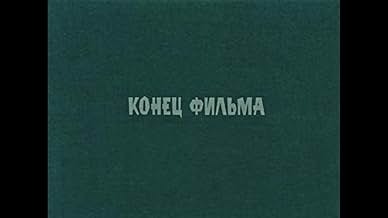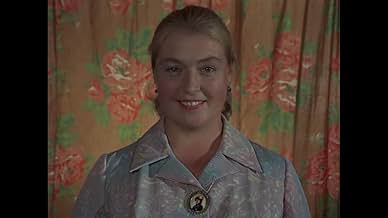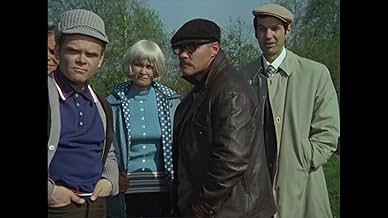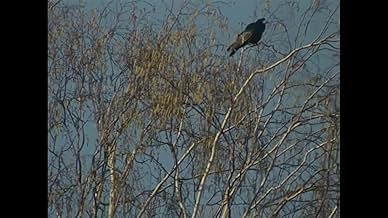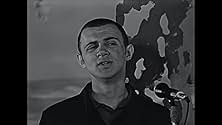Kalina krasnaya
- 1974
- 1h 50m
IMDb RATING
7.6/10
2.1K
YOUR RATING
A former thief is released from a prison. He tries to start a new life with his penfriend - a good village woman, but his past doesn't let him go.A former thief is released from a prison. He tries to start a new life with his penfriend - a good village woman, but his past doesn't let him go.A former thief is released from a prison. He tries to start a new life with his penfriend - a good village woman, but his past doesn't let him go.
- Awards
- 3 wins
Lidiya Fedoseeva-Shukshina
- Lyuba Baykalova
- (as Lidiya Fedoseeva)
Ivan Ryzhov
- otets Lyubi
- (as I. Ryzhov)
Mariya Skvortsova
- maty Lyubi
- (as M. Skvorsova)
Aleksey Vanin
- Pyotr
- (as A. Vanin)
Mariya Vinogradova
- Zoya
- (as M. Vinogradova)
Olga Bystrova
- maty Yegora
- (as O. Bystrova)
Lev Durov
- Sergey Mikhailovich, ofitsiant
- (as L. Durov)
Nikolay Grabbe
- Nachalnik kolonii
- (as N. Grabbe)
Georgiy Burkov
- Guboshlyop
- (as G. Borkov)
Iya Arepina
- sestra Yegora
- (as I. Arepina)
Tatyana Gavrilova
- Lusyen
- (as T. Gavrilova)
Anatoli Gorbenko
- Mikola Baykalov
- (as A. Gorbenko)
Natalya Gvozdikova
- Telefonista
- (as N. Gvozdikova)
Vadim Kondratev
- priyatel Koli
- (as V. Kondratev)
Aleksandr Konyashin
- Vedushchiy sobraniya
- (as A. Konyashin)
Oleg Korchikov
- Shura
- (as O. Korchikov)
Vladimir Laptev
- priyatel Nikolaya
- (as V. Laptev)
- Director
- Writer
- All cast & crew
- Production, box office & more at IMDbPro
Storyline
Did you know
- ConnectionsFeatured in The Other Day 1961-2003: Our Era: Namedni 1974 (1997)
Featured review
This is half-comical half-tragic, half-serious half-playful story of a long ago deteriorated to criminal life simple country lad, which after long years of wild living and countless jail sentences decides he can no longer bear this kind of life. He has poetic, high, even philosophical, truth-seeking soul, unique perspective on life, his own picturesque language, colorful, exhibitionist behavior. He doesn't feel comfortable in the surrounding world, he feels like a stranger both in the criminal and the normative cultures, and he feels his life is ruined. He is filled with bitterness and desire to lead a totally different sort of existence, but at first - at least make some big, beautiful gesture, succeed in having one real "day of celebration" in his sorrowful, mangled life. He also senses some underlying impropriety, pettiness, artificiality in the life of his society. The underside, or maybe the essence of the soviet living is painted in the film with a few skillful brush strokes. But he is also the one to blame in graphic confrontations with anyone he meets, because he is sure everyone is patronizing, underestimating him, and so he is trying to defend his honor. He is not strange to provocation. But he also tries to build bridges in his own awkward way, he tries to find understanding, and time after time faced with a cold response he is getting more and more angry. The point here has to do with more than the soviet society, it has to do with human nature and human life in general.
During his time in prison he leads correspondence with a divorced woman, and short after his release heads to her village. This is very simple, innocent, gentle-hearted country girl which feels compassion and even love for Egor, the main character, intuitively sensing what lies deep down in the soul of this strange man. He comes to her house and starts living with her. The panicking reaction to his arrival of her family, friends and the whole village, and his attempt to deal with it are source of countless comical episodes, which characterize interesting truly Russian and truly Soviet types. His attempt to find a job there, what follows it, and the depiction of the soviet countryside in general are also comical and present it in a critical light. But this critique is not malicious, totally non-ideological, very unique, both totally non-venomous and full of anguish and depth.
Egor tries to break his ties to the criminal world, but it doesn't let him go, his old acquaintances follow him. He tries to hide that from Luba, his new girlfriend. He generally doesn't like to disclose too much information about himself, doesn't like to talk about his past, he doesn't like when people try to peek at his soul. Parallelly he tries to repair the damage he has done over the years... He has many skeletons in his closet. Nearby lives his elderly mother, which has not heard from him for 20 years and thinks he had died. He meets his sister in the nearby city, but can't find enough strength in him to start talking to her.
Egor feels strange kinship with one thing only - his little birch trees. For some reason this gentle and genuinely Russian tree draws from him feelings which no human being can. But even when he talks to his beloved birch trees he does not abandon his typical strange tone - simultaneously artistic, deliberate, and straightforward, sincere. He is a character and a half... He really doesn't know will he eventually be able to salvage his life, succeed in getting along with people, will he be able to open his heart to someone... But he isn't even given that slim chance. His old buddies hunt him down and shoot him.
This movie is not at all a moral parable about a honest man not getting along in a crooked society, nor a story of a fallen man asking for one last chance and not getting it, nor a story about one unique individual who can not find understanding of the ordinary folks. This is a rich, paradoxical, deep, honest story about the difficult life path of a complicated and troublesome human being that frantically searches for a glimpse of inner truth in himself and in others and has to deal with everything life has to throw at him.
Shukshin's acting is a whole other issue. It is simply out of this world, completely unique and immensely powerful, and can not be compared to anything else I've seen.
This movie is very hard to categorize, it is very peculiar and unique, and it will be very hard for a non-Russian audience to understand it fully. This is a masterpiece however - a film unlike any other. Maybe it is only possible to sum it up by saying it is a creation of Shukshin - one of the most interesting Russian authors, and it is like himself - one of a kind.
During his time in prison he leads correspondence with a divorced woman, and short after his release heads to her village. This is very simple, innocent, gentle-hearted country girl which feels compassion and even love for Egor, the main character, intuitively sensing what lies deep down in the soul of this strange man. He comes to her house and starts living with her. The panicking reaction to his arrival of her family, friends and the whole village, and his attempt to deal with it are source of countless comical episodes, which characterize interesting truly Russian and truly Soviet types. His attempt to find a job there, what follows it, and the depiction of the soviet countryside in general are also comical and present it in a critical light. But this critique is not malicious, totally non-ideological, very unique, both totally non-venomous and full of anguish and depth.
Egor tries to break his ties to the criminal world, but it doesn't let him go, his old acquaintances follow him. He tries to hide that from Luba, his new girlfriend. He generally doesn't like to disclose too much information about himself, doesn't like to talk about his past, he doesn't like when people try to peek at his soul. Parallelly he tries to repair the damage he has done over the years... He has many skeletons in his closet. Nearby lives his elderly mother, which has not heard from him for 20 years and thinks he had died. He meets his sister in the nearby city, but can't find enough strength in him to start talking to her.
Egor feels strange kinship with one thing only - his little birch trees. For some reason this gentle and genuinely Russian tree draws from him feelings which no human being can. But even when he talks to his beloved birch trees he does not abandon his typical strange tone - simultaneously artistic, deliberate, and straightforward, sincere. He is a character and a half... He really doesn't know will he eventually be able to salvage his life, succeed in getting along with people, will he be able to open his heart to someone... But he isn't even given that slim chance. His old buddies hunt him down and shoot him.
This movie is not at all a moral parable about a honest man not getting along in a crooked society, nor a story of a fallen man asking for one last chance and not getting it, nor a story about one unique individual who can not find understanding of the ordinary folks. This is a rich, paradoxical, deep, honest story about the difficult life path of a complicated and troublesome human being that frantically searches for a glimpse of inner truth in himself and in others and has to deal with everything life has to throw at him.
Shukshin's acting is a whole other issue. It is simply out of this world, completely unique and immensely powerful, and can not be compared to anything else I've seen.
This movie is very hard to categorize, it is very peculiar and unique, and it will be very hard for a non-Russian audience to understand it fully. This is a masterpiece however - a film unlike any other. Maybe it is only possible to sum it up by saying it is a creation of Shukshin - one of the most interesting Russian authors, and it is like himself - one of a kind.
- underwaterhate
- Jul 5, 2008
- Permalink
- How long is The Red Snowball Tree?Powered by Alexa
Details
- Release date
- Country of origin
- Language
- Also known as
- The Red Snowball Tree
- Filming locations
- Mosfilm Studios, Moscow, Russia(Studio)
- Production companies
- See more company credits at IMDbPro
Contribute to this page
Suggest an edit or add missing content


